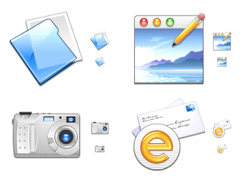The Paper PDA
Check this out: I heard about this really cool invention recently that will help you keep track of all the millions of pieces of information you have to have instant access to these days. Like addresses, phone numbers, shopping lists, appointments, etc. This invention will corral all that data and keep it safe in one easy to access place, enabling you to scan for the information when necessary. And you can always easily delete the data you don't need anymore, enabling you to keep the most important material within easy access at all times and helping you to avoid getting bogged down with now-useless details.
The name of this amazing invention? It's called paper!
Gotcha! You thought I was talking about a super souped-up PDA or some such device, right? Well, you can close your jaw now-the one that dropped open when you realized that handheld computer devices are not necessarily the be-all and end-all of data management.
Oh, PDAs have their place; I still use my Palm Pilot for a few things, especially to download articles from Avantgo (http://www.avantgo.com/), a Web clipping service for PDAs that will copy properly formatted Web pages to your device when you sync it up with your computer. It's great for train or bus trips, when you're aching for something to read while sitting in traffic (although overall, I would highly recommend purchasing a copy of the Jerusalem Post instead, since it is much more interesting and comprehensive than any of the sites you can download with Avantgo!)
But I don't use my Palm to generate shopping lists, even though it has a program to do so. I used to use it to store phone numbers and contacts, but now I use my cell phone for that. I never even bothered to learn how to take notes on it using the convoluted and confusing script system called Graffiti which Palm users need to learn for data input-the alternative being tapping on a tiny on-screen keyboard with one of those silly little plastic sticks. Who hasn't seen these people tapping away in restaurants or on airplanes and thought to themselves, 'man, what a bunch of losers!�).
Even appointments aren't PDA territory anymore. All cell phones today have a scheduling application; I find mine most useful for setting alarms at a specific time to remind me to make a phone call. If I have to be somewhere at a particular time, though, I'll probably jot the info down on a piece of paper, along with the address and directions. And after I'm where I'm supposed to be, I just throw the paper away. It just makes so much more sense than the PDA way. And of course, there's not much point in retaining old shopping lists, mapping out where in the store items are located (it's always fruit and veg on the right, meat and appetizing in the back, and dairy at the furthest end from the store entrance in this country), or even recording prices for comparison (inflation makes short work of that, and don't tell me food prices haven't been going up!)..
For all these, and many other important purposes, I turn to paper. But not just any paper-I said we were talking about a great invention (implying something new). There really is a new way to use paper to organize personal data, and PocketMod (http://www.pocketmod.com/) it its name!.
Any old piece of paper will do when it comes to making up a list or recording a message, of course, but as we all know, little scraps of paper are awfully hard to keep track of-they have a seemingly natural tendency to mysteriously disappear, surfacing months or even years later, and generating a 'what's this?' reaction when looking at the name or phone number of the long-forgotten contact. If the paper we're using could be somehow 'official,' it would be less anonymous and easier to keep track of.
Far less complicated than a Filofax, the freely downloadable and printable PocketMod has several dozen templates you can choose from to make yourself a little 'data book' out of a single A4 or 8.5x11 sheet of paper. Your data sheet can include a daily, weekly or monthly calendar, a contact sheet for recording names and phone numbers, a timesheet, shopping list, food diary, a blank sheet for notes-even a randomly generated Soduku game page and a 'tip table' (15% or 20%, depending on how generous you want to be). .
The beauty of PocketMod is its 'officialness' - you get eight pages to record specific types of data-and its smallness. The program splits up your full size sheet into the 8 pages you set, prints it out-and then directs you to fold it into a little booklet, which you can put in your shirt pocket or purse for convenient pulling-out when needed. If you print out a new one each week (using the weekly appointment sheet), you can throw away the old one, or put it into a shoebox for later reference, if you're the type that fears throwing away data. I know I'm probably going to get drummed out of the geek corps and get called all kinds of insulting names, like 'Luddite,' for saying this- but if PocketMod ever works in an Avantgo-style template for its 'paper PDA,' my Palm Pilot goes to the first taker!



the Newzgeek files

 del.icio.us
del.icio.us Furl
Furl digg this!
digg this!